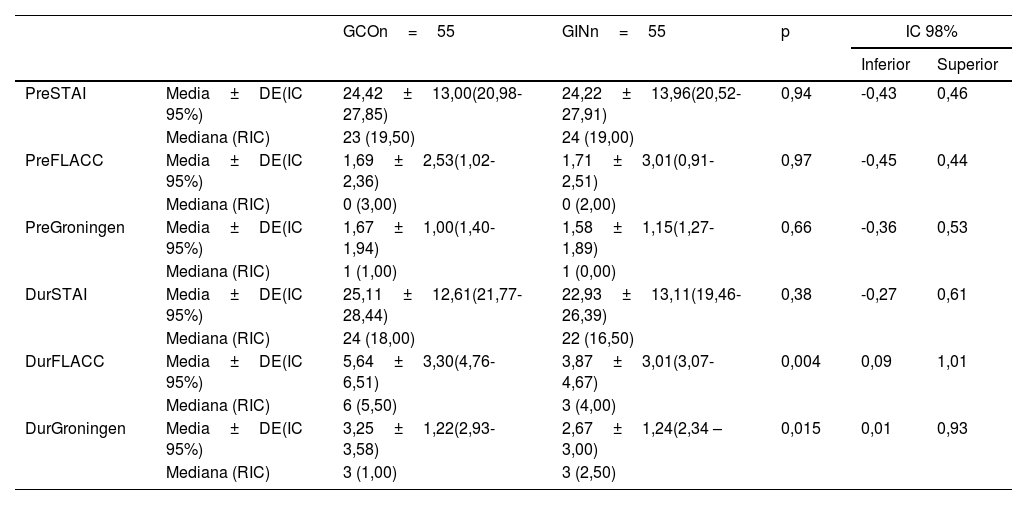Valorar, comparar y relacionar el dolor y estrés del niño en la venopunción mediante el método Distracción con Apego Koala (DAK) y método de contención física y evaluar el nivel de ansiedad percibido por los acompañantes en ambos grupos.
MétodoEnsayo clínico aleatorio simple ciego controlado en dos brazos (grupo control [GCO] e intervención [GIN]) realizado en el Servicio de Urgencias Pediátricas de un hospital universitario de tercer nivel. Las variables de estudio fueron dolor y estrés del niño y ansiedad percibida por los acompañantes en ambos grupos en el momento previo y durante la técnica. Se usó la escala de valoración del dolor Face, Leg, Activity, Cry, Consolability (FLACC); la escala de estrés de Groningen y el cuestionario de Ansiedad Estado/Rasgo (STAI).
ResultadosUn total de 113 participantes entre tres y cuatro años participaron en el ensayo (n=113). El 50% (55) fueron niñas, media de edad total 3,83±0,59 años y acompañantes 37,17±6,96. Durante la técnica la media de dolor en GCO y GIN fue de 5,64±3,30 y 3,87±3,01; de estrés, 3,25±1,22 y 2,67±1,24, respectivamente. No se hallaron diferencias estadísticamente significativas en la valoración de la ansiedad entre los grupos.
ConclusionesLos pacientes sometidos a venopunción mediante el método DAK presentan un nivel de dolor y estrés inferior a aquellos que recibieron contención física y la ansiedad percibida por el acompañante es similar en ambos grupos.
To assess, compare and relate the toddler's pain and anxiety during venipuncture by using either the Koala Attachment Distraction method or the physical restraint method and to evaluate the level of anxiety perceived by the companions in both groups.
MethodRandomised, single-blind, controlled clinical trial in two arms (control and intervention group) conducted in the paediatric emergency department of a tertiary university hospital. The study variables were pain and stress of the child and anxiety perceived by the accompanying persons in both groups at the time before and during the technique. The pain rating scale Face, Leg, Activity, Cry, Consolability; the Groningen stress scale and the STAI questionnaire were used.
ResultsA total of 113 participants aged 3 to 4 years participated in the trial (n=113). 50% (55) were girls, mean total age 3.83±0.59 years and accompanying persons 37.17±6.96. During the technique the mean pain in control and intervention groups was 5.64±3.30 and 3.87±3.01; stress, 3.25±1.22 and 2.67±1.24, respectively. No statistically significant differences were found in the assessment of anxiety between the groups.
ConclusionsPatients who underwent the Koala Attachment Distraction method venipuncture show a lower level of pain and anxiety than those who received physical restraint, and the anxiety perceived by the companion is similar in both groups.









